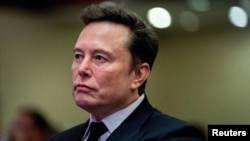LONDON — Elon Musk, the billionaire owner of X, Tesla and SpaceX and the political ally of U.S. President-elect Donald Trump, on Friday praised the German far-right Alternative for Germany party ahead of the German election scheduled for Feb. 23.
In a post on X, Musk said, "Only the AfD can save Germany."
A few hours later, the AfD's Alice Weidel — who is running for German chancellor as co-leader of the party — posted a video on X offering her gratitude to the American billionaire.
"Dear Elon. Thank you so much for your note. The Alternative for Germany, the AfD, is indeed the one and only alternative for our country — our last option, if you ask me," Weidel said. "I wish you and President Donald Trump all the best for the upcoming tenure."
German anger
The AfD party is polling in second place, at about 19%. The party's draft manifesto calls for a crackdown on immigration, a German exit from the European Union and an end to German support for Ukraine in its war against Russian invaders.
In an earlier post on X Friday, Weidel compared the EU to the Soviet Union.
Germany's Federal Office for the Protection of the Constitution has labeled the AfD as a suspected extreme-right organization, which the party rejects.
Lawmakers from across the political spectrum criticized Musk's intervention on Friday. However, German Chancellor Olaf Scholz said it was part of democracy.
"Freedom of speech also applies to multibillionaires. But freedom of speech also means that you can say things that aren't right and don't contain good political advice," Scholz told reporters Friday during a trip to Estonia.
He also questioned the economic success of X, which Musk bought for $44 billion in 2022.
Musk's intervention in German politics comes days after he met British lawmaker Nigel Farage at Trump's Mar-a-Lago resort in Florida to discuss bankrolling his right-wing populist Reform U.K. party with a reported $100 million donation — although details of any such arrangement have not been confirmed.
Elon Musk considers funding Nigel Farage's populist party in UK
Ukraine aid
German mainstream political parties have ruled out entering any coalition with the AfD, making it highly unlikely that Weidel's party will win power.
However, fringe parties have changed the discourse on support for Ukraine, says analyst Mattia Nelles of the German-Ukrainian Bureau, a consultancy based in Dusseldorf, Germany.
"They have more a negative influence on Germany's Ukraine policy in the sense that the main parties are less willing or less able to speak out in favor of more aid for Ukraine, given that they are campaigning against it — and they are portraying themselves, together with the Stalinist pro-left of populist Sahra Wagenknecht party, as the 'peace parties,'" Nelles told VOA.
"So they have a detrimental effect on the discourse by allegedly speaking for peace, but they're actually in favor of [Russian President Vladimir] Putin and of a forced peace in Ukraine — which is not a peace," he said.
Economic pressures
Germany has given Ukraine about $11 billion in military aid since Russia's 2022 invasion, second only to the United States.
Economic pressures have put government spending at the forefront of the election campaign. Scholz's Social Democrats want to raise constitutional limits on government borrowing, partly to finance aid for Ukraine.
Scholz faces a tough battle to remain in power. The Christian Democrats, under party leader Friedrich Merz, are well ahead in the polls. They oppose raising the limits on government borrowing.
"I will not focus our country's economic policy on new debt, high taxes and a lot of redistribution,” Merz said at a campaign event on Tuesday. “But I will focus our country's economic policy on performance and competitiveness. We don't want to distribute the existing small cake in a better way. We want to work together to create a bigger cake for everyone."
Trump fears
There are fears in Germany that Trump will end U.S. support for Kyiv, leaving Europe to make up the shortfall, according to analyst Nelles.
"Given Trump's return to the White House, much more German leadership and much more German finances will be required. And without debt financing, I'm afraid that won't be possible," Nelles told VOA.
"The question is whether Germany can regain its leadership role and lead Europe in an age where Trump is likely to put a lot of pressure on the Ukrainians to start peace negotiations with Russia. At that moment, a lot of German leadership will be required. And right now, there's an absence of that in Europe, and this vacuum is detrimental to Ukraine and to Europeans at large," Nelles said.
Trump has repeatedly demanded that NATO allies spend more on defense, which would place additional strains on German finances.
"We're looking at funding gaps of well above €30 billion [$31.3 billion] annually just to keep the 2% [of GDP] NATO spending goal in 2027 and beyond,” Nelles said. “So, if we're looking at more defense spending, the question is how that is going to be financed — and at the cost of what."





Forum